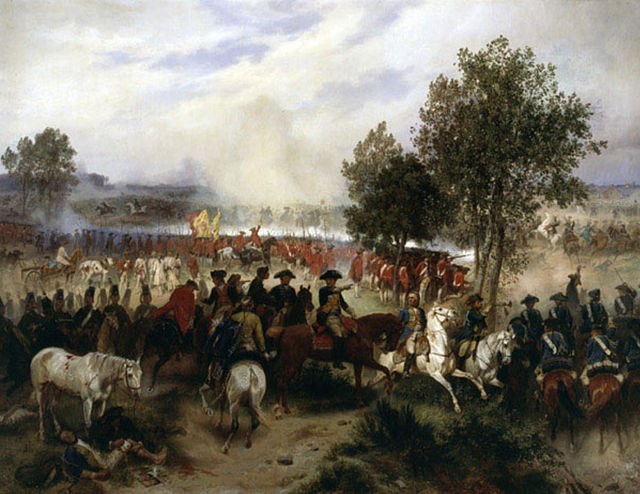Top Qs
Timeline
Chat
Perspective
Battle of Krefeld
1758 battle of the Seven Years' War From Wikipedia, the free encyclopedia
Remove ads
The Battle of Krefeld (sometimes referred to by its French name of Créfeld) was fought at Krefeld near the Rhine on 23 June 1758 between a Prussian-Hanoverian army and a French army during the Seven Years' War.
This article needs additional citations for verification. (August 2007) |
Remove ads
Background

The Hanoverian Army led by Ferdinand, the Duke of Brunswick and brother-in-law of Prussian King Frederick the Great, had driven the French led by the Comte de Clermont back across the Rhine. Ferdinand's own army had crossed to the left bank of the Rhine and was now in a position to threaten the frontier of France itself. The Battle of Rheinberg fought on 12 June proved indecisive. Clermont, who had recently replaced the Duc de Richelieu in command of the French army, was attempting to stem Ferdinand's advance. He chose a defensive line on the south side of a walled canal running roughly east and west. Thus the walled canal constituted a sort of natural fortification that Clermont thought would be easy to defend.
Remove ads
Battle
The allied Prussian and Hanoverian troops led by the Duke of Brunswick seized the initiative attacking the entrenched defensive French forces.[2][3] After feigning an attack against Clermont's own right flank, Ferdinand executed a wide flanking march, crossing the canal out of sight of the French and emerging from a wooded area on Clermont's left flank. Clermont, who had just sat down for a midday meal, was late in sending reinforcements and, as a result, his left flank was crushed.
The Comte de Gisors, the popular, charismatic, only child of the French minister of war, the Duc de Belle-Isle, was mortally wounded while charging at the head of the French Carabiniers. The Comte de St. Germain, who commanded the French left wing, was nevertheless able to put together a sufficient defense to prevent a complete rout, and the French army retired from the field in relatively good order.
Remove ads
Aftermath
The Erbprinz Charles William Ferdinand, son of the ruling Duke of Brunswick-Lüneburg, who would die of wounds received at the battle of Jena in 1806 during the Napoleonic Wars, particularly distinguished himself commanding the allied flanking troops. Clermont asked to be relieved of his command after this defeat, and his wish was granted. He was succeeded in command by Marshal de Contades.
Notes
References
External links
Wikiwand - on
Seamless Wikipedia browsing. On steroids.
Remove ads

